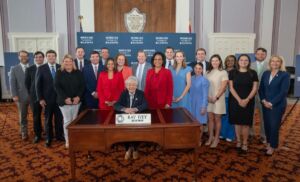Governor Ivey Signs Landmark ‘Working for Alabama’ Legislative Package into Law


Joining Governor Ivey at the bill signing was Lieutenant Governor Will Ainsworth, Senate President Pro Tem Greg Reed (R-Jasper), House Speaker Nathaniel Ledbetter (R-Rainsville), Senate Minority Leader Bobby Singleton (D-Greensboro), House Minority Leader Anthony Daniels (D-Huntsville) and BCA President Helena Duncan.
The bipartisan, six-bill package aims to streamline and make more efficient and effective the state’s efforts and strategies in these respective areas.
“Our state leaders over the past few years have taken up several ambitious challenges to address Alabama’s top areas of need,” said Governor Ivey. “And the results are paying out in dividends. From broadband to infrastructure to The Game Plan we passed last year and now, Working for Alabama, we have come together to put Alabama first and have paved the way for a stronger economy and a better quality of life for all Alabamians.”
One of the primary goals of Working for Alabama has been to solve one of Alabama’s biggest economic challenges, its Labor Force Participation Rate, which at 47th in the nation is one of the worst in America. Almost half of the state’s working-age individuals are neither employed nor seeking jobs.
“Growing Alabama’s economy and creating more long-lasting, high-paying, 21st century jobs ranks high among my top priorities,” said Lieutenant Governor Ainsworth. “That is why I created the Lieutenant Governor’s Commission on 21st Century Workforce and asked members of the legislature and business community to work together in identifying our biggest obstacles and finding workable solutions. Signing the Working for Alabama package into law, represents a strong step toward more jobs, opportunities and prosperity for everyone who calls our state home.”
One area of need identified by the study group on labor force participation rate is the availability of affordable childcare, which is a barrier to entry for thousands of Alabamians.
“Alabama’s economy is growing at a historic pace, but that doesn’t mean we can hang our hats on yesterday’s success – we have to keep pushing forward,” said Speaker Ledbetter. “The Working for Alabama package is the result of state leaders being keenly aware of what’s standing between Alabama and its full potential. The House Labor Shortage Study Group identified the lack of affordable childcare and housing as two of the most prevalent barriers keeping Alabamians sidelined from the workforce. I have no doubt that our action on these two issues, as well as the other key areas of this package, will help Alabama families and our economy thrive like never before.”
Senate President Pro Tem Greg Reed said Alabama needs to streamline its strategies to better compete against other states in economic development and job recruitment.
“Our state has positioned itself to be a national economic and workforce development leader for years to come. The investment made by the legislation passed in the Working for Alabama package will pay huge dividends for Alabamians, and we are proud of work done to maximize our efforts to incentivize businesses and industry to choose Alabama. Because of the investments and resources outlined in this legislative package, families and businesses across our state will grow and thrive and Alabama will remain the best place to call home,” said Senate President Pro Tem Reed.
Senate Minority Leader Bobby Singleton echoed Reed and said part of making the state more competitive is ensuring that our rural areas are successful.
“The Working for Alabama package didn’t just happen overnight, this took bipartisan efforts in both chambers of the Legislature addressing some of our state’s top vulnerabilities,” said state Sen. Singleton. “I’m proud of the way we worked together to make this happen. A particular focus of mine throughout this process has been to make sure the rural areas of our state are given the support they need. Working for Alabama will make key investments into some of our state’s communities in the most need of support.”
House Minority Leader Anthony Daniels said the package is a big win for Alabama and will touch the lives of thousands of Alabama families.
“Working for Alabama is an example of how the Legislature – both Republicans and Democrats – can come together and get real results that make our state a better place to live, work and raise a family,” said state Rep. Daniels. “I was proud to carry the child care tax credit bill with my colleague Senator Garlan Gudger – that will touch the lives of thousands of Alabama families. Working for Alabama is a big win for our state, and it is great to see it make it to the finish line.”
BCA President and CEO Helena Duncan said, “In order to attract and grow 21st century jobs, Alabama must have a 21st century approach to economic and workforce development. This package creates a job-ready workforce by helping Alabamians identify their skills, talents, and goals and provides the tools necessary to cultivate and hone them. Working for Alabama was the result of a team effort that included Gov. Kay Ivey, Lt. Gov. Will Ainsworth, legislative leadership, and our committed corporate partners like Alabama Power, who took the lead in making that vision a reality. This effort, and the hope and promise it represents, demonstrates that when Alabamians work together, we can overcome any obstacle, meet any goal and create a better future for citizens across our state.”
The Legislation signed includes the follow bills:
SB247 – Alabama Workforce Transformation Act: This bill merges and consolidates duplicative workforce development agencies, programs, and funding mechanisms into one single, repurposed state agency that will be led by a cabinet-level official who has primary responsibility for the state’s workforce development activities.
SB252 – Alabama Growth Alliance Act: This bill creates the Alabama Growth Alliance, a public corporation governed by a board of public and private leaders. The Alabama Growth Alliance would be formed to coordinate the development, tracking, as well as providing input and support for the creation and maintenance of the state’s long-range economic development strategy, annual objectives, and key tactics to achieve the long-range strategies.
SB253 – Alabama Workforce Pathways Act: This bill establishes a Workforce Pathways diploma at the K-12 level and reinvest in Career & Technical Education (CTE) centers across the state. This pathway will better prepare those students to enter the workforce and/or earn credentials that will help lead directly to employment in their chosen field.
HB346 – Housing Tax Credit: This bill establishes a state workforce housing tax credit like programs implemented in 29 other states. It complements the existing federal housing tax credit program created by the Reagan Administration designed to incentivize private capital investment in the development of affordable workforce housing.
HB358 – Childcare Tax Credit: This bill creates tax credits to incentivize employers to fund childcare options and childcare providers to expand access to and quality of childcare. The tax credits would be available for employers that provide on-site childcare or stipends to employees for childcare expenses. Tax credits would also be available to for-profit childcare providers that voluntarily participate in the state’s childcare quality rating program, and donors to nonprofit childcare providers for the improvement or operation of the facilities.
SB336 – Research and Development Corridors Bill: This bill allows municipalities to authorize the incorporation of a research and development corridor within the corporate limits as a public corporation for the purpose of undertaking activities or acquiring property by the corridor, and using its revenues for the establishment, benefit, or support of qualified enterprises.
